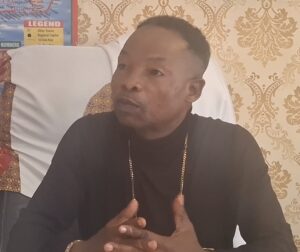
Daniel Nyame, Eastern Regional Coordinator for Small-Scale Miners
Small-scale miners have rejected calls for an outright ban on their operations. Instead, they are advocating a roundtable discussion to explore sustainable solutions to the ongoing crisis in the sector.
The miners’ call comes on the back of an ultimatum from Organized Labour to the government for swift action to address the environmental threats posed by galamsey. Small-scale miners, however, argue that a blanket ban on small-scale mining would only create more problems.
“A total ban is a recipe for chaos. Where will these small-scale miners find their daily bread?” Daniel Nyame, the Eastern Regional Coordinator for Small-Scale Miners, stated in an interview.
Economic significance
Mr. Nyame emphasized the vital role the small-scale mining sector plays in Ghana’s economy, particularly in cushioning the local currency, the cedi. He warned that any attempt to shut down the sector would further destabilize the economy.
“The cedi would have been GHS25 to US$1 by now if not for mining,” noted Suleman Koney, Chief Executive of the Ghana Chamber of Mines, in a corroborating statement.
According to a 2016 UNEP report, small-scale mining provides direct employment to over one million Ghanaians, and supports an additional five million people. In contrast, the large-scale mining industry employs around 8,760 workers and 25,603 contractors, as per the 2020 Ghana Extractive Industries Transparency Initiative (GHEITI) report.
Push for dialogue
Meanwhile, Godwin Armah, General Secretary of the Ghana National Small-Scale Miners Association, had also echoed Nyame’s sentiments. In a media interview, Armah advocated a more comprehensive approach to addressing the galamsey crisis, pointing out that military interventions and temporary bans had failed to produce lasting results.
“Fighting galamsey with the military is not sustainable. We need a holistic and multifaceted approach to end the menace,” he indicated. Mr. Armah emphasized that past efforts, including military crackdowns and imposed bans on mining, had only proven ineffective in the long run. “Clamping down on galamseyers is a very difficult fight. To opt for a complete ban on small-scale mining is not and will never be the solution,” he added.
Environmental concerns
The environmental toll of illegal mining is becoming increasingly alarming. Reports from the Ghana Water Company Limited indicate that more than 60% of the country’s water bodies have been polluted due to galamsey operations. In addition, rampant deforestation and land degradation are creating long-term environmental challenges.
While calls for more stringent action grow, the government has ruled out an outright ban on small-scale mining. Instead, it is proposing a series of interventions aimed at mitigating the environmental damage while supporting legal miners.
Small-scale miners’ proposals
The Small-Scale Miners Association has put forward additional proposals aimed at fostering greater collaboration with the government. These include restricting the import of changfan machines used in illegal mining, empowering community taskforces, and decentralizing the EPA to the district level.
The miners also advocate publicizing the identities of arrested galamsey operators, scaling up land reclamation efforts, and promoting the use of technology in the sector.
The small-scale miners believe that a roundtable discussion involving all key stakeholders is essential for evaluating and implementing these proposals effectively.
“We need a comprehensive dialogue that brings together all interested parties to chart a sustainable path forward,” Mr. Armah added.







